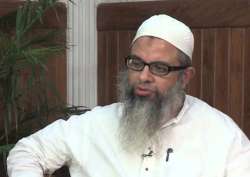'No toilet, no nikah', say Muslim clerics in Haryana, Punjab
Muslim clerics in Haryana, Himachal Pradesh and Punjab have decided not to solemnise marriage in a house where there is no toilet, Jamiat Ulama-i-Hind has said.

Muslim clerics in Haryana, Himachal Pradesh and Punjab have decided not to solemnise marriage in a house where there is no toilet, Jamiat Ulama-i-Hind has said.
Maulana Mahmood A Madani, Secretary General of Jamiat Ulama-i-Hind said that having a toilet has been made a mandatory condition for Muslim marriage in the three states and will be soon be applied in all other states in the country.
"Maulvis and muftis in Himachal Pradesh, Punjab and Haryana have decided that they will not solemnise the 'nikah' or Muslim marriage in a house where there are no toilets," he said.
The announcement was made by Madani, a former Rajya Sabha MP, during the inauguration of Assam Conference on Sanitation (ASCOSAN) 2017 conducted here in Khanapara last week.
"I feel that all religious leaders from all the religion throughout the country should decide that they will not conduct any rituals in houses where there are no toilets," he said.
Emphasising on cleanliness and sanitation, he asked people to use toilets and also to make not only Assam, but the country as a whole clean.
"There are two types of cleaning - one is external and the other internal. Both are interconnected, we will only be able to achieve the internal cleaning if our body is clean," he said.
Speaking at the conference, Assam Chief Minister Sarbananda Sonowal also emphasised on the importance of sanitation and hygiene and asked the people of the state to make cleanliness as their life's goal.
With the objective to showcase the commitment of the state and the people towards achieving the goal of Swachh Assam, ASCOSAN-2017, the biggest conference in the history of Assam, was organised in the city.
The sanitation conference, which has vowed to make Assam clean and open defecation-free (ODF) by this year, was attended by more than 6,000 people including those from the district level functionaries, Panchayati Raj Institution (PRI) members, urban local bodies as well as experts, corporate houses, and local people.
Sonowal is aiming to make the state the cleanest by October 2, 2017, two years prior to Prime Minister Narendra Modi's vision of a 'Clean India' by 2nd October 2019.
"Cleanliness should be our life's goal. Even the greatest men in history including the Father of the Nation, Mahatma Gandhi and various monks and sages teach us to follow sanitation and cleanliness," said Sonowal.
"Humans take birth and die, but once a good work is started, it never dies and stays forever. Change will come only through hard work and I request everyone to work hard to make the state an example for the whole country," he said.
Global Interfaith WASH Alliance (GIWA) also participated in the conference which brings together various faith leaders of major religions of India to put forward their faith-based message for WASH and take a pledge to work for it in their areas of influence.
He also made the public take a pledge at the conference to make the state clean. To encourage the spirit of sanitation he also awarded five cleanest villages.
Awards were also given to first ODF village, Gram Panchayat and block. Various 'Sanitation Heroes' who have done commendable work in the sector and contributed in furthering the cause of Swachh Assam were also awarded.
"The awards are being given to encourage people to work hard for making the state clean," said Sonowal.
Rangchapara, a Garo village in Goalpara district, was awarded as the cleanest village in the state.
"The concept of 'Sanitation first' is a step towards 'Make India', which is our new slogan along with Make in India which is started by the prime minister," said Swami Chidanand Saraswati, Founder and chairman GIWA India.
"For achieving sanitation, we need political, personal and public will. Today we need to take everyone together without any boundaries and gaps. This, in true sense will be 'sabka sath sabka vikas'," he said.
(With PTI inputs)